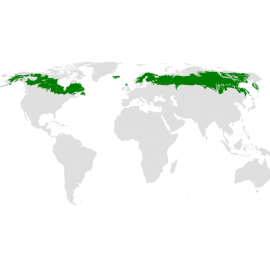Taiga Syndrome
-
English
-
ListenPause
[intro music]
Welcome to World Ocean Radio…
I’m Peter Neill, Director of the World Ocean Observatory.
In a recent edition of World Ocean Radio, we discussed the vast bio-region of the Amazon river, forest, and watershed, that constitutes a biodiversity concentration with enormous potential for carbon sequestration, environmental sustainability, and supply of clean water, food, and other support for a multi-national indigenous population. The Amazon is, of course, under severe and evermore destructive attack by corporate deforestation, erosion, mining, industrial agriculture, and social dislocation.
Another such system is called the taiga, the enormous boreal forest and wetlands that lies across the top of Canada and the Russian Federation with similar value and similar challenge. The scale is enormous; the Russian taiga at 12 million square kilometers is almost double the size of the Amazon region, a source of oil reserves, water, and forest products that represents one major calculation for the nation’s future. The conventional evaluation, of course, is based on an old world economic paradigm and geopolitical calculation of return by export of oil and timber to the European Union, India, China, Africa, and elsewhere as an essential contribution to Russian revenues and finance. These consumer nations are grappling today with Russia’s invasion of the Ukraine, the resultant disruption of civil society, the extremity of targeted financial sanctions, the exclusion from the European market, and the international pressure, especially on India and China, to resist by boycott or alternative energy suppliers and new technologies, fearful of national economic distress, limited near-term supply and demand, sudden decline in growth, production, and consumer expectation, and possible political upheaval.
But what if Russia could look at its energy potential and the taiga in another way? As with the Amazon, the global financial accounting is changing and systems of production and exchange are shifting toward a new calculation of asset value that includes the monetization of carbon offsets, a controversial approach that allows for contributors to climate emissions to continue ongoing fossil fuel production, sales, and burning by financing carbon removal or reduction by others seemingly to counteract their own destructive behavior. Does this formula ultimately reduce emissions? Not really. It just transfers accountability to others, the best result being net zero, no more, a clever perpetuation of the status quo. Offsets seem a false start, easily exposed.
But it is interesting if Russia, and all the fossil fuel economies, might choose an alternative as follows: a combination of actions that would blend reduced fossil fuel extraction and destructive emissions with the pursuit of increased alternative production such as wind, hydraulic, or geothermal energy -- the adoption of a new value proposition for carbon sequestration, that is, value added and monetized by the absorption of existing carbon, conservation-directed maintenance and sustainability of extraordinary natural systems worldwide, enabled by a new accounting that deducts the negatives of pollution, adds the positives of alternatives, and brings Russia and others into, perhaps beyond, a new climate neutral world and integrated ecology-driven global economy. The taiga managed is more valuable than the forest cut, sold, burned, and polluted. Clean air is more valuable to local health, national wealth, and climate change mitigation than demonstrably destructive practice minimally advantageous to Russia or any other nation. Carbon sequestration is more honest, effective, and curative as climate action than false accounting, national hypocrisy, and false economy. Social stability is more valuable than social unrest or revolution. Russia is more valuable to the world as a participant in a sustainable global system than as an outlaw nation, making war, paradoxically, on others and itself.
The taiga, and the Amazon, descending into the world ocean, are more than balance sheet assets, profits for governments and oligarchs; they are an inter-connected Nature-based solution, an integrated, supremely valuable resource available in every place and at every level of society, worldwide, and rather than as abused and destroyed, they are most essentially valuable sustained as a way to survivability and a guarantor of peace.
We will discuss these issues, and more, in future editions of World Ocean Radio.
[outro music]
Last week we discussed the vast bio-region of the Amazon River, one of the most productive and important ecosystems on the planet. This week we highlight another system--the taiga--an enormous boreal forest and wetland at the top of Canada and part of the Russian federation. Both of these systems are more valuable sustained than exploited.
About World Ocean Radio
Peter Neill, Director of the World Ocean Observatory and host of World Ocean Radio, provides coverage of a broad spectrum of ocean issues from science and education to advocacy and exemplary projects. World Ocean Radio, a project of the World Ocean Observatory, is a weekly series of five-minute audio essays available for syndicated use at no cost by college and community radio stations worldwide.
World Ocean Radio is produced in association with WERU-FM in Blue Hill, Maine and is distributed worldwide by the Public Radio Exchange and the Pacifica Network.
Available for podcast download wherever you listen to your favorites.
Image
Global distribution of the Taiga and Boreal forest biome, and the Caledonian forest ecoregion. The biome and ecoregion data used for this map and a full citation can be found at https://www.worldwildlife.org/publications/terrestrial-ecoregions-of-the.... January 2019. Mark Baldwin-Smith, Wikimedia Commons
- Login to post comments



